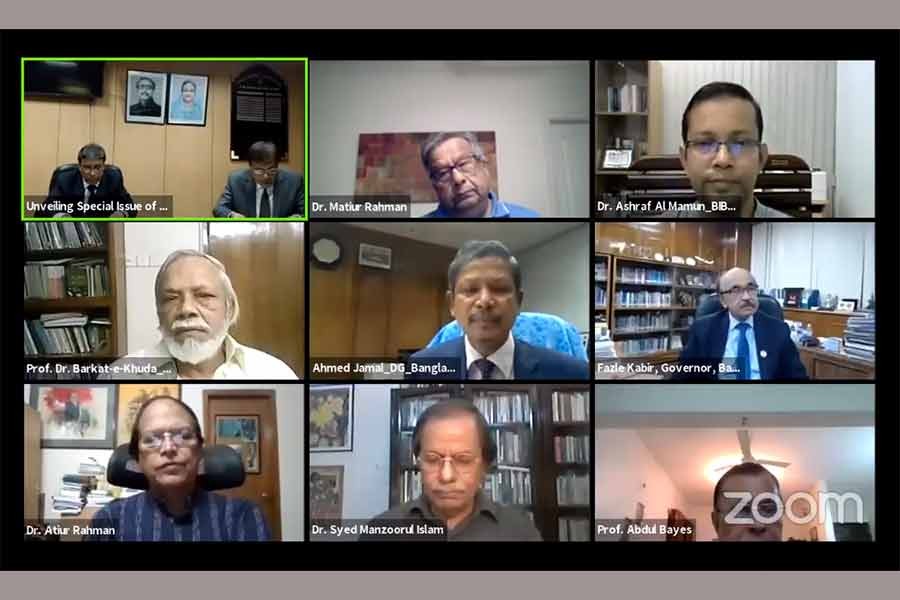Bangladesh still has a long way to go to accomplish the vision of ‘Sonar Bangla’ or the golden Bengal, as dreamt of by Bangabandhu, economic analysts and former officials say.
They regret that corruption has been a major cause for concern in the nation’s development journey.
“Sonar Bangla means there will no deficiency in fulfillment of basic needs for everyone, no widening income gap, no opportunity gap in employment and education, no social discrimination, and poverty reduction, and a corruption-free society,” Matiur Rahman, a JPMorgan Chase Endowed Professor of Finance at McNeese State University, US, said.
The observations were made at a virtual session to unveil a special issue of ‘Bank Parikrama’ as part of celebrating the birth centenary of the father of nation Bangabandhu Sheikh Mujibur Rahman, organised by Bangladesh Institute of Bank Management (BIBM) on Wednesday evening.
Dwelling on the visionary leadership of Bangabandhu, Dr Mohammed Farashuddin, a former governor of Bangladesh Bank, said despite all the achievements, the country has to cover a long distance to attain his dreamt Sonar Bangla.
He underlined the need for bringing the development of the rural economy to the forefront of the national agenda, as emphasised by Bangabandhu.
Matiur Rahman, also a former central banker, pointed out that compared to 1972, the country’s banking sector has progressed a lot. “But we have a long way to go to fulfill the Sonar Bangla dream of the father of the nation,” he said.
“Sadly, corruption has been a cultural fact we have to deal with it and we have to manage how to work effectively to advance the country within those perimeters,” he added.
In his article titled “Role of Banking Services in Building Sonar Bangla: Some Progress, Pitfalls and Prescription” published in the Parikrama, Mr Matiur Rahman mentioned that it is nearly impossible to stop corruption in view of its culture, which has to be dealt with effective management.
“Unless everybody responsibly performs respective duties, the government can’t alone control corruption,” he noted.
He added the banking sector, too, has been plagued by a series of problems.
“We have developed a culture of loan default, loan rescheduling, and loan write off, that has become very messy in the public sector banks compared to the private sector banks,” he said.
He explained that the social cost of writing off loans is ‘very high’ as it takes away the resources from productive investment in education, health, and social advancement. He termed the practice of extension of loans of huge amounts under political pressure a serious problem.
Former Vice-Chancellor of Jahangirnagar University Professor Abdul Bayes told the discussion that around one-third of the rural people borrow from ‘mohajon (informal hedge financers)’ while 40-50 per cent of people receive loans from NGOs and only around 10 per cent borrowers get loans from government sources.
“People are still exploited by the mohajans while there is scope for exploitations in getting loans from NGOs due to higher interest rates comparing to the banking rates,” he said.
“So, the rural people’s access to easy financing is still a long shot,” he observed.
Addressing the event as chief guest, Bangladesh Bank (BB) Governor Fazle Kabir said Bangabandhu made the financial sector the cornerstone of his national policy between 1972 and 1975.
“Although Bangabandhu was not an academic economist, his deep understanding of the real status of our economy, as well as financial conditions of the masses, made him a great practical economist and a real mentor of the economy and the financial sector,” he said.
His predecessor Dr Atiur Rahman said the central bank has to work a lot to deal with changed economic realities induced by the adverse effects of climate change visible around the world.
He also emphasised innovative digital banking and financial services for the financial inclusion of the rural people.
Chaired by BIBM Director-General Dr Md Akhtaruzzaman, the discussion was also addressed by former Vice-Chancellor of Bangladesh Agricultural University (BAU) M A Sattar Mandal, former Professor of Dhaka University Dr Syed Manzoorul Islam, BB deputy governor Ahmed Jamal, and BIBM Professor Prashanta Kumar Banerjee.
BIBM published the special issue of the quarterly journal 'Bank Parikrama', its flagship publications, in which 10 articles of eminent economists, academics, bankers and researchers have been published.


